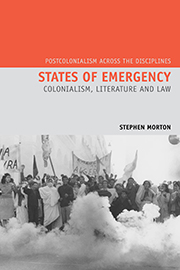Book contents
- Frontmatter
- Contents
- A Note on Translations
- Acknowledgements
- Introduction
- Part I
- Part II
- 3 States of Emergency, the Apartheid Legal Order and the Tradition of the Oppressed in South African Fiction
- 4 Torture, Indefinite Detention and the Colonial State of Emergency in Kenya
- 5 Narratives of Torture and Trauma in Algeria's Colonial State of Exception
- Part III
- Conclusion
- Bibliography
- Index
3 - States of Emergency, the Apartheid Legal Order and the Tradition of the Oppressed in South African Fiction
from Part II
- Frontmatter
- Contents
- A Note on Translations
- Acknowledgements
- Introduction
- Part I
- Part II
- 3 States of Emergency, the Apartheid Legal Order and the Tradition of the Oppressed in South African Fiction
- 4 Torture, Indefinite Detention and the Colonial State of Emergency in Kenya
- 5 Narratives of Torture and Trauma in Algeria's Colonial State of Exception
- Part III
- Conclusion
- Bibliography
- Index
Summary
In an article published in the South African Communist party newspaper New Age in September 1960, the leftwing writer Alex La Guma declares, ‘What a calamity the Emergency has been – for Afrikaner Nationalism’. While La Guma concedes that the people detained under the emergency suffered in various ways – either through bankruptcy, redundancy, imprisonment without trial or a ‘sickening uncertainty’ about the duration of their detention – he repeats the claim that the ‘Emergency was a calamity for Afrikaner nationalism’. In a rhetorical move that recalls Benjamin's Eighth Thesis on the Concept of History, La Guma suggests that the emergency highlights the fact that the suspension of civil liberties for the South African population is the raison d'état of the nationalist government and its apartheid policies rather than the exception. ‘When the state is forced to throw aside its cloak of legality, and to surrender every claim to moral action’, La Guma adds, ‘it is doomed no matter how much physical force it may command’. Such a prescient declaration identifies the autoimmunity of South Africa's apartheid state: the emergency measures introduced by the apartheid government would bring about its own destruction. If the emergency highlighted a ‘connection […] between the Police State and the Afrikaner people’, it also prefigures the emergence of the very thing that the state is trying to control and repress: the ‘multiracial and multinational’ composition of the South African population.
- Type
- Chapter
- Information
- States of EmergencyColonialism, Literature and Law, pp. 89 - 118Publisher: Liverpool University PressPrint publication year: 2013



